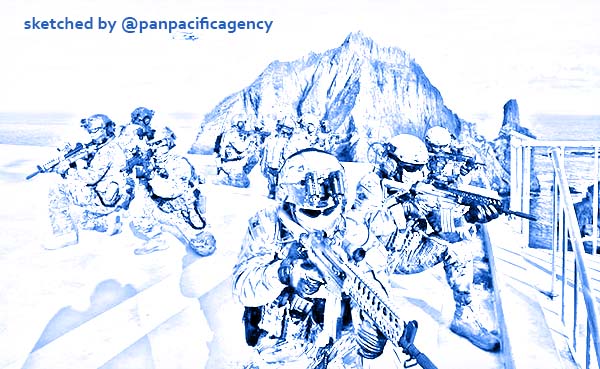S. Korea, US may cancel summertime combined exercise due to COVID-19: sources

Members of South Korean Naval Special Warfare Group take part in a military exercise in remote islands called Dokdo in Korean and Takeshima in Japanese, South Korea, August 25, 2019. South Korean Navy/Yonhap via REUTERS. Sketched by the Pan Pacific Agency.
SEOUL, Jul 11, 2020, Yonhap. South Korea and the United States appear increasingly likely to scale back or even call off a major combined exercise again due to the new coronavirus, after indefinitely postponing their annual springtime drill earlier this year, sources said Saturday, The Korea Herald reported.
The repeated skipping of annual exercises, if realized, is feared to affect the joint combat posture between the two countries, as well as South Korea’s planned takeover of the wartime operational control (OPCON) of its forces from the U.S.
“Both sides share the need to stage the summertime exercise as planned, and we’ve continued consultations on the matter. But things are highly flexible due to the COVID-19 situation,” a defense ministry official said.
Seoul and Washington usually carry out major combined exercises twice a year — in around March and August. But they postponed this year’s springtime exercise due to COVID-19, and it has not been held to date, as the health crisis continues.
They have yet to fix the schedule and detailed programs for the upcoming exercise.
“It already seems practically impossible to push for the summertime exercise normally, given that the U.S. has not taken action for the troop deployment to South Korea necessary for the exercise,” a source said.
“Most of the U.S. members mobilized for an exercise are reserve forces, which means they have their jobs. Putting them in weekslong isolation is far from easy,” he said. “The adjustment or cancellation seems to be a plausible option.”
All overseas visitors to South Korea are required to be quarantined for two weeks due to the coronavirus.
Another factor that needs to be taken into consideration is the tenure of South Korea’s Joint Chiefs of Staff chairman.
No official term of office is set, but the JCS chairman is supposed to serve for around 18 months to two years, and the incumbent Chairman Gen. Park Han-ki took office in October 2018.
The Seoul government is expected to announce Park’s successor around September.
“It would not be easy to carry out such a major exercise at the time of changes of command,” another source said.
Seoul and Washington also differ over the program of the summertime exercise.
The South Korean authorities stressed that it should focus on the assessment of Seoul’s capabilities to retake the operational control of its troops from Washington, just as they agreed earlier.
But the U.S. military maintains it should be meant to boost their joint posture as a replacement of the springtime training, rather than preparations for the OPCON transfer, according to the sources.
On July 1, U.S. Forces Korea Commander Gen. Robert Abrams, who also commands the Combined Forces Command, stressed that their semiannual theater-level combined exercises, as well as live fire trainings based on rigorous scenarios, should take place to maintain a staunch readiness posture in the face of evolving threats by North Korea.
To verify whether Seoul is on course to meet the conditions for the transition, the two sides carried out an initial operational capability (IOC) test in August last year, and their defense ministers decided to move on to the next step of carrying out the Full Operational Capability (FOC) test.
“If the two sides had staged an exercise earlier this year, they could have been able to do a kind of run-through for the FOC test,” the source said.
The Seoul authorities believe that the two sides earlier decided to conduct an FOC test and Seoul has been fully prepared for the event. But the U.S. appears to be wanting to fully comply with due procedures for the complete verification, he added.
Seoul and Washington have been working for the conditions-based OPCON transfer. No specific deadline has been set, though many see the two sides eyeing 2022, or thereabouts, as the target date.
The combined exercise issue appears to affect their decision on when to have the planned South Korean and U.S. defense ministers’ meeting.
In May, the defense ministry said the two sides are working to set up a videoconference call between their defense ministers in June to discuss pending issues. But the date has not been fixed yet.
“Chances are that the top-level talks would be held when the two countries reach a consensus on this sensitive matter,” the source said.